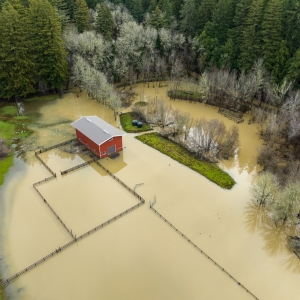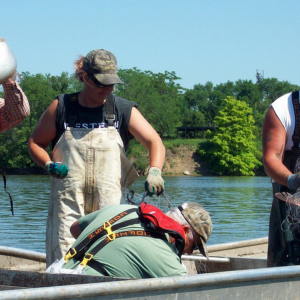Fresh, July 11, 2023: Chicago Officials Reverse Flow of River As Flash Floods Fill City Sewers
July 11, 2023
Fresh is a biweekly newsletter from Circle of Blue that unpacks the biggest international, state, and local policy news stories facing the Great Lakes region today. Sign up for Fresh: A Great Lakes Policy Briefing, straight to your inbox, every other Tuesday.
— Christian Thorsberg, Interim Fresh Editor
This Week’s Watersheds
- The city of Duluth, Minnesota receives an $8 million dollar federal grant to rebuild part of its Lakewalk.
- After record-setting rainfalls, Chicago officials reverse the flow of the Chicago River into Lake Michigan and urge residents to reduce water use.
- Federal funding for the $3.2 billion Soo Locks project in Sault Ste. Marie, Michigan appears behind schedule for the second year in a row.
- Governor Tony Evers enacts the 2023-25 Wisconsin state budget, which includes millions of dollars to address PFAS pollution and groundwater management.
Amid another summer of flooding, damaged crops, and coastal erosion, leaders in Michigan propose new clean energy legislation.
“For Michigan to do this would put it at the vanguard not just of state clean-energy policy but of global clean-energy policy. Michigan is globally recognized as the industrial heart of America, and one doesn’t think of it as being a clean-energy leader. A lot of people will see this as a surprise.” — Dallas Burtraw, an analyst at Resources for the Future.
The state of Michigan has been slow to move off of dirty fuels — coal was its largest producer of electricity in 2021 — the emissions of which contribute to higher overall temperatures and more extreme, erratic precipitation events. As Michiganders reconcile this summer’s floods, erosion on the Great Lakes’ shores, lost crops, and algal blooms — while much of the Corn Belt endures record drought — Gov. Gretchen Whitmer is “seizing that opportunity to propose some of the most ambitious climate laws in the world,” The New York Times reports.
The “MI Healthy Climate Plan” would require Michigan to “generate all of its electricity from solar, wind, or other carbon-free sources by 2035, eliminating the state’s greenhouse pollution generated by coal- and gas-fired power plants.”
With Democrats holding only a two-seat lead in both the state House and Senate, and many Republicans arguing against the reliability of wind and solar energy, an anticipated autumn vote on the legislation will be too close to call.
Fresh from the Great Lakes News Collaborative

- Michigan State Parks are getting overdue maintenance work thanks to federal funds — Michigan Radio
- Michigan bottle return rate fell after pandemic ban. Would a price hike help? — Bridge Michigan
- What are wetlands for, anyway? — Great Lakes Now
The Great Lakes News Collaborative includes Bridge Michigan; Circle of Blue; Great Lakes Now at Detroit Public Television; and Michigan Radio, Michigan’s NPR News Leader. We work together to produce news and information about the impact of climate change, pollution, and aging infrastructure on the Great Lakes and drinking water. This independent journalism is supported by the Charles Stewart Mott Foundation. Find all the work here.

Reversing the flow of the Chicago River
Five to six inches of rain fell on Chicago last Sunday, with 24-hour totals nearing nine inches on the city’s West Side, Block Club Chicago reports. The city’s NASCAR downtown street race was riddled with weather delays, and more than one thousand home and business owners reported flooding on their properties.
With water systems and reclamation plants straining at capacity, city officials moved to reverse the flow of the Chicago River back into Lake Michigan, the first time they had done so since May 2020.
River water pollutes the lake, from which the city receives its drinking water. The decision was made to prevent further flooding, and officials said they processed water from further out in the lake, where the river water didn’t reach.
“Don’t run the dishwasher, don’t wash your clothes, shorten your baths and showers,” Allison Fore, a spokesperson at the Reclamation District, told Block Club. “We want to keep as much water out of the system as possible. When you flush your toilet, that water goes into the same pipes that are collecting all the stormwater and getting overloaded with rain.”
Overflow water storage held around 6 billion gallons of water over the wet weekend. A project currently underway, led by the Metropolitan Water Reclamation District, will expand underground reservoir storage to 17.5 billion gallons. It is estimated to be completed in 2029.
In the News
Duluth Lakewalk: Heavy storms, high water levels, and giant waves from a tumultuous Lake Superior contributed to tens of millions of dollars of damage to Duluth’s Lakewalk, a popular coastal pedestrian and bike trail, in 2017 and 2018. The city has slowly rebuilt choice sections of the trail, and a new $8.2 million grant from the U.S. Department of Transportation will be used to construct what was the Lakewalk’s most-used section, Minnesota Public Radio reports. The one-year project is expected to begin in the fall of 2024.
Soo Locks Slowdown: For the second year in a row the federal government is “on track” to underfund the Soo Locks megaproject, The Detroit News reports. Located on the St. Mary’s River in Sault Ste. Marie, Michigan, the locks allow vessels to manage a 21-foot elevation change. Slow funding for the $3.2 billion project could push back its 2030 estimated completion and spur even higher costs, according to The Detroit News.
Looking Ahead
Wisconsin Budget Made Official: Governor Tony Evers enacted the 2023-25 Wisconsin state budget last week, which includes $125 million “to address and prevent PFAS contamination statewide,” WTAQ reports. Other key freshwater spending includes $1 million for private well owners to replace or clean their contaminated sites, $4 million set aside for the Urban Nonpoint and Municipal Flood Control Program, and $6.5 million “for grants under the Targeted Runoff Management Program.”
Upcoming Events
July 17 – 20 — Dredging Summit & Expo ’23 — learn more
July 20 — Exploring the Connections Between Climate Change and the Foods We Eat — learn more
July 27 — Great Lakes Water Quality Board Public Meeting — learn more
July 27 — Student Stewardship: Monitoring Freshwater Acidification — learn more and register
Other News
Wisconsin Drought: 93 percent of Wisconsin — affecting 5.5 million people — is under drought conditions this summer, Wisconsin Public Radio reports.
Chicago’s Lead: Limited funds, “contentious” work, and other lead-related priorities have contributed to Chicago still having some 400,000 lead water pipes, more than any other U.S. city, AP reports.
Christian Thorsberg is an environmental writer from Chicago. He is passionate about climate and cultural phenomena that often appear slow or invisible, and he examines these themes in his journalism, poetry, and fiction.






How are Zebra muscles impacting water quality and the cost of maintaining upgrades and fixes?
1. Invasive Zebra Muscles Muscles clean contaminated water turning many soupy green lakes and rivers into clear water lakes and rivers.
2. Invasive Zebra Muscles also attach to canal walls, boat hills, and clog pipes.
3. Plus, dead Zebra Muscles wash up on beaches and cut feet.. or live muscles lining canals get partially crushed or broken and cut unsuspecting swimmers or workers.
I’m guessing that some of the concerns from decades ago are not as bad but also a few new concerns have arisen.